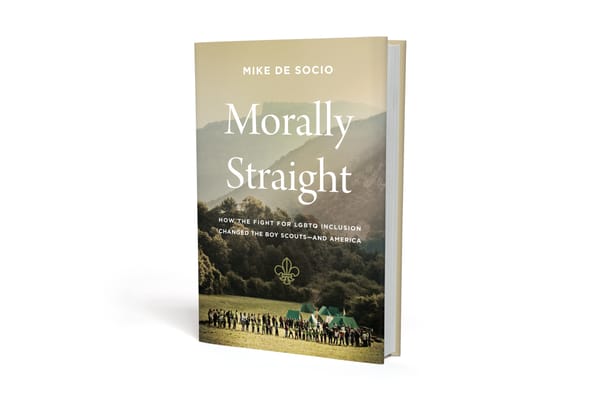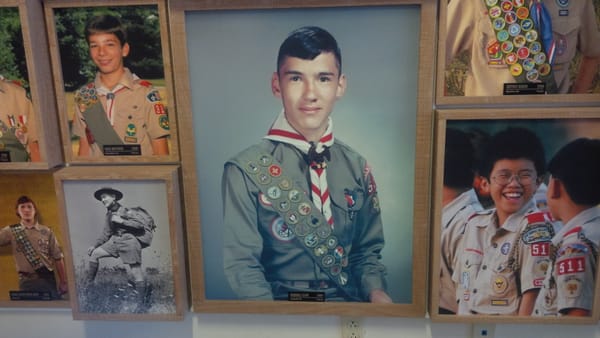'Are You Tougher than a Boy Scout?'
The National Geographic show from 2013 is a rich cultural text.

In January, 2013, a 20-year-old eagle scout named Will Oliver logged onto Change.org.
He was there to start a petition—an increasingly common thing for scouts to do around that time, when the controversy over the BSA’s gay membership ban had roared back into the news. But Oliver’s target was not the BSA itself. No, his petition was aimed squarely at the National Geographic Channel.
Why? Because the network was set to release a new series titled, “Are You Tougher than a Boy Scout?" The show, which came across as a thinly-veiled effort by the BSA to stem membership losses and distract from the gay policy issue, was being promoted with gritty images of teenage boys in uniform, drenched in sweat, paddling manically in a canoe.
Oliver, who considered himself an outdoorsman, didn’t want the show canceled. In fact, he wrote in his Change.org petition that he understood the need to make Scouting seem “cool” to a new generation of kids. But he did want the National Geographic Channel to denounce the BSA's anti-gay policy, in the form of a disclaimer at the top each episode.
“I personally believe that Scouting is cool. Discrimination, on the other hand, is not,” Oliver wrote.
Plenty of people agreed with him. By early March, the petition gathered 120,000 signatures. Oliver traveled to Nat Geo’s headquarters in Washington, D.C., on the day the new series was set to premiere, and delivered his petition. He met with the network’s spokesperson, who declined to add the disclaimer to the show, but offered Oliver the opportunity to write a guest blog post on its website ahead of the premiere.
Under the headline, “A #ToughScout is Brave Enough to Support Gay Youth,” Oliver recounted his own experience in Scouting, as well as the stories of Ry Andresen (a gay youth kicked out on the eve of earning eagle scout) and Jennifer Tyrrell (the den mother whose expulsion kickstarted the renewed push to end the gay ban). He ended the post by calling on Nat Geo, once again, to “do the right thing.” He wrote: “We can’t afford to be silent about things that matter – and surely, few things matter more than providing equal support for all our country’s youth.”
I remember watching this news cycle unfold in real time, as an eagle scout and high school senior that year. I remember Oliver’s petition and certainly saw the splashy ads for “Are You Tougher than a Boy Scout?” But for whatever reason—maybe a moral opposition on the same grounds as Oliver—I never watched it.
That is, until this week.
And let me tell you, this show is a rich cultural text. For all the hype and controversy it generated, I found it to be surprisingly mediocre. It felt at times like the producers were trying to shoehorn a string of relatively low-stakes competitions into the high-octane model of “Fear Factor” or “Survivor.”
Take the first episode, for example (which is, admittedly, the only one I could bring myself to watch). It opens on a nostalgic note, with a black-and-white TV displaying clips of scouts canoeing and camping, before it revs up into full color, teasing the high-speed contests to come: more canoeing, some climbing and, of course, fire-building.
We meet six scouts—all white boys—who are given toughened-up nicknames like “Wolf,” “Yeti,” and “Robin Hood.” And then we meet their adult competitors: A trio of 30- and 40-something men with white-collar jobs and, crucially, a burning desire to prove they could have been eagle scouts (a rank that eluded all three former scouts) if they had tried a little harder.
“I am here this week to try to get that dream back,” says Mark, a 45-year-old drama teacher.
The adults launch into their first challenge, a scout-skills scavenger hunt, with a chant: “Old men! Old men! Gonna be a scout again!”
The challenges that follow are almost embarrassingly simple. In one, the competitors must knock metal cans off tree stumps using a slingshot. In another, they are told to scale a rock face using a large rope. And in the third, they must fish bobbing containers from a lake using a ring buoy.
Don’t get me wrong, each of these tasks involves some skill, and both the scouts and adults struggled at points to complete them. But as a viewer, I thought to myself, are these really the most impressive abilities scouts have to offer? They seemed less like essential life skills, and more like fun party tricks.
The young scouts end up winning the scavenger hunt and, back at camp that night, confer in the privacy of their tent about which adult should be sent home. The deliberation is a bit melodramatic, complete with cutaway confessionals, considering there is nothing on the line—no money, no prize—except pride.
John, a 43-year-old software professional, ends up on the chopping block. He departs sorrowfully, saying “I’m a survivor … My boys love me, and that’s not gonna change at all.” (I would hope not.)
The next day, the remaining two adults face off with the scouts in a three-part canoe challenge (racing, tug-of-war, and jousting) that leaves the scouts, once again, victorious.
The last one standing by the end of the episode is Mark, the drama teacher. To win, he must compete in a wilderness survival course that requires him to build shelter, start a fire and fashion a wooden spear. As I watch them frantically complete each task, I feel like this challenge does the best job of displaying scout skills, even if it still leans a bit too macho for my taste. (At one point, the competitors cover themselves in mud as a kind of wilderness sunscreen, and eat rations that turn out to be a handful of worms.)
Mark manages to beat his youthful challenger by a hair, claiming victory against the scouts. “It’s official,” he says breathlessly as the credits roll; he’s tougher than a boy scout.
Watching this episode now, ten years after it aired, I couldn’t help but cringe. For one thing, I felt disappointed by the picture it painted of Scouting. Sure, the outdoor skills the competitors flexed throughout the episode are part of the program—and an important one, at that. But to me, they’re not the most valuable. The scout skills I still use every day in my adult life don’t involve slingshots and mud; they involve leadership, communication and a strong sense of values. But I get it: Those skills are a lot less sexy, and don’t make for thrilling TV.
More than anything, I was irked by the context in which this show premiered. I can’t know for sure when the BSA and National Geographic started filming, but the gay membership controversy had taken over the news almost a full year before “Are You Tougher than a Boy Scout?" hit the airwaves. So at a time when BSA leaders were doubling down on discrimination against gay youth, they were also presenting a picture of Scouting that seemed to exist in a total vacuum: a place where boys and men could embrace the rough-and-tumble core of the program, and ignore all those pesky policy questions.
I think Will Oliver said it best: “Unfortunately, what viewers may not see on National Geographic Channel is how tough Scouting can be for gay teens who serve among Boy Scouts of America’s ranks.”


